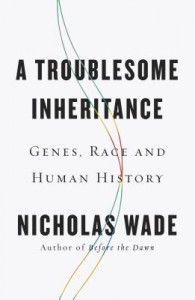Dans A TROUBLESOME INHERITANCE: GENES, RACE AND HUMAN HISTORY, Nicholas Wade énonce sa courageuse théorie sur les races et les différences génétiques.
Un ouvrage destiné à relancer un ancien débat, tout en évitant la dérive raciste : publié il y a une semaine, l’essai de ce journaliste du New York Times a déjà fait la couverture de The Spectator, le plus ancien magazine en langue anglaise, a reçu une longue et favorable critique du Wall Street Journal et a fait son début dans le Top 25 des livres scientifiques de la dernière New York Times Bestseller List.
Drawing on startling new evidence from the mapping of the genome, an explosive new account of the genetic basis of race and its role in the human story
A TROUBLESOME INHERITANCE: GENES, RACE AND HUMAN HISTORY
by Nicholas Wade
Penguin Press (USA & Canada), May 2014
“It is hard to convey how rich this book is….The book is a delight to read—conversational and lucid. And it will trigger an intellectual explosion the likes of which we haven’t seen for a few decades….At the heart of the book, stated quietly but with command of the technical literature, is a bombshell….So one way or another, A Troublesome Inheritance will be historic. Its proper reception would mean enduring fame. » —The Wall Street Journal
 Few ideas have been more toxic or harmful, or have been used for worse ends, than the idea of the biological reality of race, and with it the idea that humans of different races are biologically different from each other. But Nicholas Wade, inconvenient as it may be, believes that there is truth in this view. Race is inherently not a bright-line distinction; by definition it means that the more human populations are kept apart from each other and for longer periods of time, the more they will evolve their own distinct, separate traits under the selective pressure known as Darwinian evolution. Wade’s most controversial claims involve the genetic basis of human social habits, such as the genetic basis for the tendency to be more or less violent. Inevitably such assertions get caught up in questions of “better” and “worse,” which are pernicious; Wade argues the more subtle point that some traits are more adaptive for some specific environments than others and that science needs to set its course for the truth, come what may, taboos or no. With brave, scrupulous care and lucidity, Wade forays into this scientific minefield and endeavors to arrive at a coherent summary of what the new genetic science does and does not tell us about race and human history. This will not be the final word on the subject, but it will begin a mighty and in some respects overdue conversation.
Few ideas have been more toxic or harmful, or have been used for worse ends, than the idea of the biological reality of race, and with it the idea that humans of different races are biologically different from each other. But Nicholas Wade, inconvenient as it may be, believes that there is truth in this view. Race is inherently not a bright-line distinction; by definition it means that the more human populations are kept apart from each other and for longer periods of time, the more they will evolve their own distinct, separate traits under the selective pressure known as Darwinian evolution. Wade’s most controversial claims involve the genetic basis of human social habits, such as the genetic basis for the tendency to be more or less violent. Inevitably such assertions get caught up in questions of “better” and “worse,” which are pernicious; Wade argues the more subtle point that some traits are more adaptive for some specific environments than others and that science needs to set its course for the truth, come what may, taboos or no. With brave, scrupulous care and lucidity, Wade forays into this scientific minefield and endeavors to arrive at a coherent summary of what the new genetic science does and does not tell us about race and human history. This will not be the final word on the subject, but it will begin a mighty and in some respects overdue conversation.
